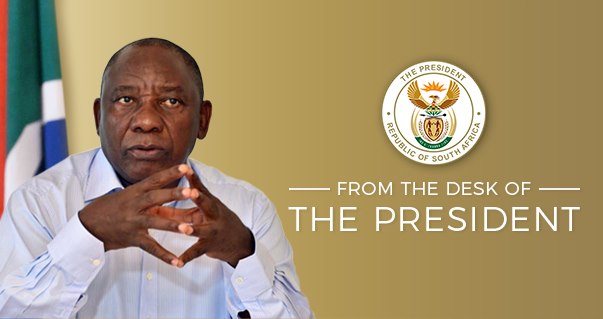FROM THE DESK OF THE PRESIDENT - 7 NOVEMBER 2022

OUR COMMON FUTURE DEPENDS ON CLIMATE ACTION NOW
Fellow South Africans,
Seven months ago, parts of our country experienced a deadly natural disaster that showed how vulnerable South Africa is to the effects of climate change.
The floods that lashed parts of KwaZulu-Natal, North West and the Eastern Cape in April this year were of such intensity that they laid waste to nearly everything in their path.
Homes were swept away by the rising waters and landslides. Businesses and properties were waterlogged, causing millions of rands in damage. Key infrastructure like ports, rail lines and roads were damaged or destroyed, resulting in substantial losses to the economy. Worst of all, more than 400 people lost their lives.
It has long been established that there is a clear connection between the frequency of extreme weather events and climate change. It is also well-established that climate change has increased the likelihood of such events recurring.
According to one study, extreme weather events that were once expected every 40 years, now happen every 20 years. Extreme weather like flooding is also increasing in intensity. During the April floods, the city of Ethekwini received the equivalent of 110 days of rainfall in just one day.
This week I will be attending the 2022 United Nations Climate Change Conference in Egypt, also known as COP27.
The Conference is taking place at a time when developing economy countries are coming under increased pressure to contribute more to reducing global warming.
South Africa will be chairing a high-level roundtable on just transition, where we will be making the case for developed economies to do more to support developing ones to meet their climate change commitments.
Although South Africa is playing its part in the global climate change effort, we have been consistent in emphasising our right to development. We must ensure that the transition to a low-carbon, climate change resilient economy does not jeopardise our developmental goals. The move from fossil fuels to greener, cleaner energy sources cannot take place at the expense of economic growth and job creation.
We go to COP27 in a strong position. We recenty adopted a Just Transition Framework to guide our national approach to this process. Last week we released the Just Energy Transition Investment Plan for public comment. It lays out the investments that are needed for us to realise our decarbonisation goals.
Africa historically bears the least responsibility for climate change, but it is Africa that is feeling its effects most.
Seven years since the Paris Agreement was adopted at COP21, countries with developed economies have largely failed to honour their commitments to provide substantial financial support for climate actions in developing economies.
One of the issues we will be highlighting at COP27 is that multilateral financial institutions need to lower the cost for developing economies to borrow money to fund their climate adaptation and mitigation efforts.
Many people may think that the discussions taking place in Egypt at COP27 are far-removed from their everyday lives. This is far from the case. We all have a clear stake and an abiding interest in the outcomes of COP27.
The flooding earlier this year, the wildfires in the Table Mountain range, the locust plague outbreak in parts of the Northern Cape, Western Cape and Eastern Cape, are all associated with climate change. They affect our health and safety, our social and economic infrastructure and our nation’s food security.
As a country we will be outlining our own contribution to the global climate change effort, but at the same time be making a clear call for developed economy countries to meet their obligations.
It is only with this substantial support that we will be able to build the resilience that is needed to protect our country and safeguard our economy. It is only with significant additional funding that we can ensure that future generations of South Africans live in an environment that is clean, conducive to health and well-being, and that has not been destroyed because of the inaction of today’s leaders.
With best regards, 


